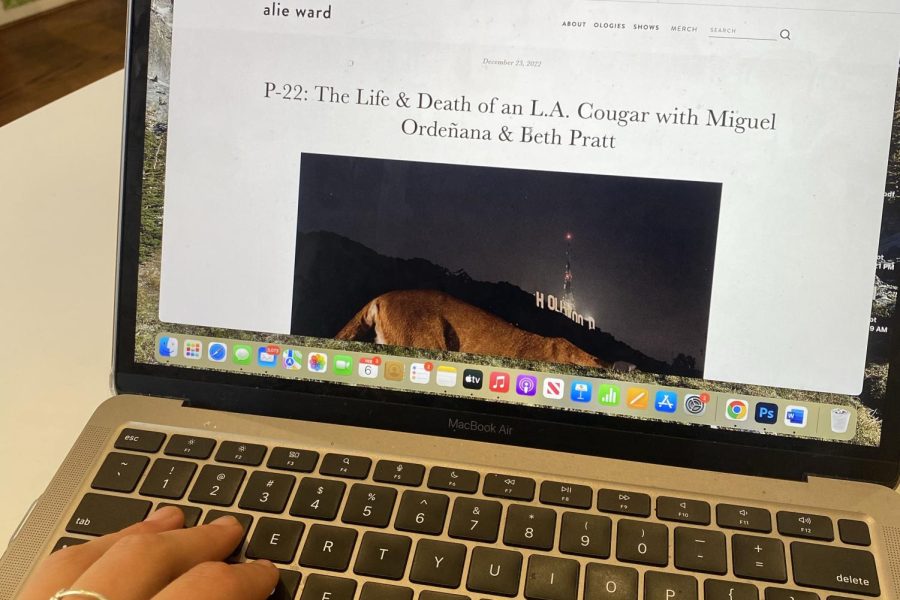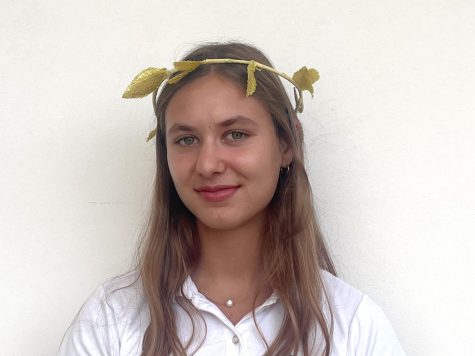Column: Five “Ologies” episodes you should listen to
Photo credit: Melissa Forman
The Ologies episode “P22: Life and Death of an LA Cougar” plays on Columnist Eliza Tiles’ computer. The episode was released shortly following the death of P-22 a cougar who called LA’s Griffith Park Home.
February 9, 2023
I’m pretty sure half of my personality results from the “Ologies Podcast,” but is that a bad thing?
I first discovered Alie Ward’s quick-witted satire during a long drive on Route 395. I was instantly captivated by Ward’s ability to ask the obvious (and not-so-obvious) questions to an array of experts in scientifically adjacent fields.
According to Miriam Webster, “Ologies” translates to “a subject of study; a branch of knowledge,” and that’s exactly what this podcast is. From traditional science-based topics like weather and climate to topics you didn’t even know could be scientific like The Paris Catacombs, Ologies gets people excited to learn, and that’s what I love most about it.
Although its incredibly difficult not to talk about every single episode, I’ve narrowed it down to five I believe capture the powerful natural and comedic world of the “Ologies Podcast”. When doom scrolling makes me overcome with sadness for the state of the world, I listen to the newest episode of Ologies, and I’m reminded of the possibilities of both the natural and not-so-natural world and of the wonderful people working to preserve it.
1.) “Enigmatology”
Enigmatology: the podcast that started many Clark Street crossword puzzles with the assistance of a few Brentwood students and baristas. I was enamored by the art of the crossword and brain chemistry David Kwong details, from cryptic crosswords to identifying patterns. Kwong explains that “when [he] sees the word ‘hero,’ [he’s] thinking this is probably about a sub sandwich, not a superhero.” And over the past few months of my own crossword endeavor, I’ve learned to look to “eat away” or “eat at” when I see the word “erode.” Similarly, puzzle makers seemingly have an obsession with “Sweden’s capital” in the daily clues. Although the podcast gives a good inside into the construction of world puzzles and the benefits of playing them, it did not inform me that I would be horrible at solving them — yes, even the Monday.
2.) “Vampirology”
Dr. Jeff Holdeman is a professor of Slavic and Eastern European Culture at India University and teaches a course titled “The Vampire in European and American Culture.” This episode particularly blew my mind, as I knew nothing more about vampires other than that Selena Gomez voiced one of the creatures in “Hotel Transylvania.” Yet, unlike other Halloween cliches, Vampires have a robust and interesting history spanning from the early 18th century in southeastern Europe. In the first part of “Vampirology,” Ward and Holdeman highlight the need for a folkloric vampire in the early 18th century as a means of explaining illness. They then transition to Nosferatu, Dracula, and Carmilla (the first female vampire) in modern-day media. Even if you’re not a vampire lover, this podcast will suck your blood away.
3.) “Summersode”
I first listened to the “Summersode” episode while running to the beach on a hot summer day. I remember weaving in and out of the sidewalk chasing shade and anticipating my first dip into the cold Pacific. Since my departure from summer camp, I never felt like I was able to fully embrace the cliches of summer, yet this podcast transported me to a summer filled with campfires and bear sightings. In this episode, Ward interviews an array of specialists on topics that are sure to get you excited about summer. I can always count on Alie Ward to detail the science of kissing on a random morning and bring on the vibes of the season.
4.) “Forensicecology”
I was baffled by the idea of a nature detective when I first listened to “Forensicecology.” Isn’t that just a fancy name for a scientist? No. Dr. Tiara Moore is a Forensicecologist and Marine biologist who researches soil and ocean sciences, unveiling the hidden causes behind toxic tides, fungi and algae blooms to name a few. This episode is more science-based but nonetheless interesting. It details Moore’s work with #BlackiInMarineScienceweek, an organization that celebrates Black marine scientists, promotes environmental issues and supports the next generation of scientists, while also highlighting the importance of community and women within STEM fields.
5.) “Goodfire”
Growing up with “fire days” instead of snow days, I always feared the thought of smokey October mornings and bright orange sunsets. The horrific idea of communities burning down and animals being set free to fend for themselves made me wince at the idea of a fire season. So, when I saw an episode titled “Goodfire,” which combines the concept of fire as a positive thing with Indigenous practices, I was hooked. The episode details the combination of Western science and Indigenous knowledge in relation to healthy forests and the importance of controlled burning. If you’re looking to mend your relationship with fire, look no further.
In each episode, Ward donates to a cause that the “Ologiest” (or the person being interviewed) chooses. As a listener, I appreciate that my presence makes a difference in an array of topics — many of which I never knew existed. Podcasts can be powerful tools to spark passion within people and, in Ologies case, science. I have appreciated the podcast’s dedication to environmental, social and mental issues.
Podcasts like this help people become aware of new topics through a lighthearted, entertaining standpoint. I hope you too become hooked on crosswords, tell everyone you meet about the history of vampires or get involved with #BlackInMarineScienceWeek.









